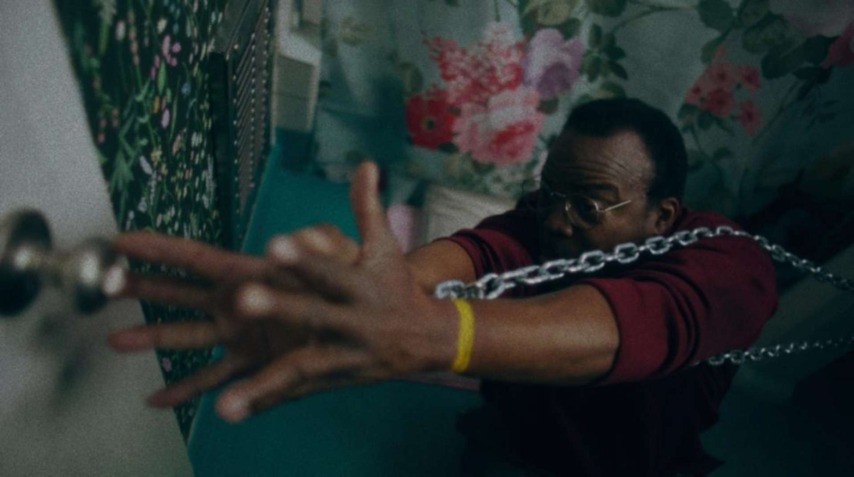Shot in six weeks on a shoestring budget, Joe DeBoer and Kyle McConaghy’s Dead Mail looks far more finely crafted than its scrappy origins might suggest. Set in the early ‘80s in a podunk Midwestern town, the era-appropriate embellishments are authentic (and devoid of errant nostalgia) while being entirely pivotal to the plot. Although the film has a certain languidness—shaving the 100-minute runtime down would have amplified the tension—its commitment to dissecting the internal workings of analog keyboards and the USPS prove just as intriguing as the unstable killer who threatens professionals in both of these fields.
Opening with a bound, bloodied man desperately crawling to a mailbox to send out an unaddressed plea for help, Dead Mail sets itself up as a straightforward investigative thriller before suddenly shifting to the perpetrator’s perspective. It first centers on Jasper (Tomas Boykin), who works as a “dead mail” investigator at a remote USPS branch, tracking down the owners of misdirected letters and packages. Regaled as a talented sleuth, Jasper often (and illicitly) employs the skills of an Oslo-based acquaintance named Renée (Nick Heyman), whose possession of a then-rare computer system greatly assists Jasper in his investigations. After successfully contacting the owner of an expensive diamond necklace, Jasper moves on to the next object in the pile. He looks befuddled by a torn piece of paper, speckled with what seems to be blood, that features the chilling sentence: “Help me kidnapped.”
It’s here, around the 20-minute mark, that Dead Mail violently departs from Jasper as a protagonist. The film now follows Trent (John Fleck), an aloof fellow who feels like a spiritual successor to Hannibal Lector, sans cannibalism. Jumping back to the weeks before Jasper comes across the letter, the film unpacks the circumstances behind its existence. After meeting at a conference for electronic keyboard enthusiasts, Trent eagerly forms a “partnership” with Josh (Sterling Macer Jr.), a skilled technician working on meticulously crafting a synth effect that imitates woodwind instruments. When Josh is scouted by a Japanese tech company, Trent becomes inconsolable and reacts in a shocking—though perhaps not entirely unprecedented—manner, which leads to Josh’s eventual mailing of the cryptic note.
The story and characters concocted in Dead Mail are captivating in their own right, but what truly entrances is the faithful recreation of middle America as it slowly transitioned between the muted tones and wood-paneled emphasis of ‘70s interior decoration to the slightly more sleek (though never ostentatiously neon-soaked) vibe of the ‘80s. Plush, dark forest green carpeting lines the hallway of Trent’s home, which is otherwise adorned with mahogany furniture and the odd pop of mustard yellow. The fashion worn by Jasper’s co-workers, talkative Bess (Susan Priver) and sweet yet strong-willed Ann (Micki Jackson), are intricately layered but never flashy, featuring a color palette composed of beige, navy, and a pop of red. Technological devices, from keyboards to computers to telephones, are perfectly unassuming, appearing less like haphazardly sourced props and more like the product of research-based curation. Even the hazy grain overlay isn’t merely a cheap gimmick, but a clever (and budget-friendly) method for evoking an aura of unease; it’s all the better for being slightly imperfect.
Another boon of Dead Mail is its entrancing synth score, composed by the filmmakers themselves. There are no comparisons here to the legendary electronic compositions of fellow horror filmmaker John Carpenter, as it adheres to a musical strain all its own. It doesn’t utilize radical shifts in volume or tone, staying relatively consistent in its strange melody throughout the runtime. This not only builds anxiety due to its unfaltering, creepy drone, but allows for the intra-film fixation on synthesizer music to shine through. The reverberation caused by amps or the off-kilter tone of a work-in-progress keyboard add a sonic texture that is just as absorbing, enveloping viewers in the air of experimentation that led to the advent of electronic music.
If DeBoer and McConaghy’s feature falters anywhere, it’s in the pacing, which at times deflates the suspense that they’re otherwise successfully building. As opposed to letting dread linger in extended interactions between Trent and Josh, the viewer’s awareness of the hostile downturn their relationship will soon take means that disquietude gives way to boredom. This is largely only an issue during the film’s halfway mark, as the final act unexpectedly brings characters together and culminates on an intense (and literal) sorrowful note. With no discernable editor role on the film’s IMDb page (or within the end credits themselves), this points to another side effect of truly independent production; if this is the case, the likely team effort of the edit is actually quite impressive, with no pointed continuity errors or story issues.
It’s no wonder that Dead Mail premiered at SXSW last year on the strength of its blind submission, nor that it was programmed in TIFF’s genuinely boundary-pushing Midnight Madness section. It is both evocative of iconic predecessors (there are heavy hints of Silence Of The Lambs here) and entrenched in a unique style—both visibly home-spun and impeccably detailed—bolstered by the collaboration of the film’s writer-directors. In a Variety interview out of the 2024 edition of SXSW, DeBoer was coyly self-deprecating: “If we can both be an individual C+, but combined, we’re a B-, why wouldn’t we entertain that?” Evinced by the score on this review alone, the duo have clearly been selling themselves short.
Director: Joe DeBoer, Kyle McConaghy
Writer: Joe DeBoer, Kyle McConaghy
Starring: Sterling Macer Jr., John Fleck, Tomas Boykin
Release Date: April 18, 2025 (Shudder)









































